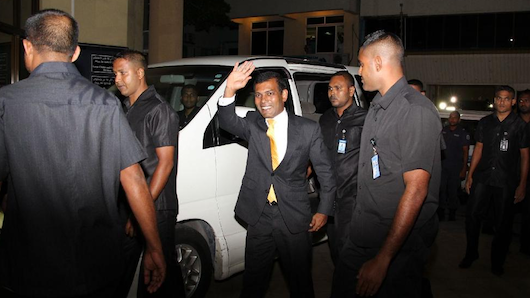An opposition Maldivian Democratic Party (MDP) MP has appealed for Indian prime minister Narendra Modi’s help to secure the release of imprisoned ex-president Mohamed Nasheed.
The disappearance of Minivan News journalist Ahmed Rilwan, death threats against journalists and human rights defenders, and an arson attack against opposition-aligned Raajje TV are “symptomatic of the Maldives’ slide into tyranny,” MP Eva Abdulla wrote in a letter to the Indian prime minister.
“I hope you can use your good offices to pressure the Maldivian government to release President Nasheed and other political prisoners, return to rule of law, uphold the constitution and protect the basic human rights of all Maldivians,” reads the letter sent on April 22.
Eva’s appeal was echoed by Amnesty International last week, which warned that the human rights situation in the Maldives is “rapidly deteriorating” with the government cracking down on peaceful protests, stifling dissent, and imprisoning opposition politicians.
Raghu Menon, Amnesty International India’s advocacy coordinator, said India as a regional power “has a responsibility to work towards a human rights-friendly environment in the Maldives.”
The ruling coalition has previously condemned calls for Indian intervention as “irresponsible”.
“Urging India to intervene in a sovereign nation’s internal affairs is a betrayal of our constitution. Its results will be bitter, especially on the Maldivian public,” majority leader of parliament Ahmed Nihan told Minivan News after Nasheed urged India before his arrest in February to ensure the security of opposition politicians.
Foreign minister Dunya Maumoon has also expressed confidence that India “will not intervene in domestic politics of Maldives.”
Following Nasheed’s arrest and prosecution on controversial terrorism charges, Modi dropped the Maldives from a tour of Indian Ocean neighbours in early March.
Nasheed was sentenced to 13 years in prison last month on terrorism charges related to the military’s detention of a judge during his tenure. The 19-day trial was widely criticised by foreign governments, the UN, and Amnesty International for its apparent lack of due process.
“Slide towards dictatorship”
Rilwan’s disappearance on August 8 in a suspected abduction “highlights the nature of today’s Maldives, where the rule by fear has taken the place of rule of law,” Eva wrote.
The government’s commitment to finding Rilwan was “questionable” as president Abdulla Yameen refused to comment on the disappearance.
“Of the many human rights abuses that have taken place in the Maldives, Rilwan’s has resonated across the country for its encapsulation of every fear within our society,” she said, adding that the disappearance came after “months of intimidation against journalists, civil society, and independent institutions.”
The public was still awaiting answers, she continued, as police have not “credibly” investigated the murder of former MP Afrasheem Ali, the attempted murder of Raajje TV journalist Ibrahim Waheed ‘Asward’, and the torching of Raajje TV’s studios.
Eva accused the current administration of using its parliamentary majority to “crush dissent, eliminate political opposition and make laws to facilitate executive and judicial tyranny” and offering immunity from prosecution to violent gangs that operate with impunity.
“An impunity and patronage the government makes no attempt to hide,” she added.
She further contended that “confessions through torture, show trials, and state sponsored violence” of the autocratic past have returned under president Yameen.
However, Eva said “Maldivians refuse to be cowed by president Yameen’s authoritarian tactics” and have taken to the streets to protest against “the slide towards dictatorship.”
“In tightening its grip, the regime appears to be losing it,” she suggested.
“More political parties, politicians and activists are leaving the regime and joining the opposition coalition.”
The Indian government has “the power to make a difference in the Maldives” and had been crucial to the success of the democratic reform movement that culminated in the adoption of a rights-based constitution and multi-party elections in 2008.
“The movement cannot end yet, we have come too far to leave this conflict to our children,” she wrote.
“So we ask India’s help again. I believe it is in India’s interest to see the Maldives return to the democratic path. We cannot afford another failed Muslim democracy, nor a front of instability in the Indian Ocean.”

